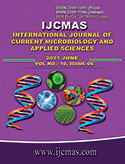


 National Academy of Agricultural Sciences (NAAS)
National Academy of Agricultural Sciences (NAAS)

|
PRINT ISSN : 2319-7692
Online ISSN : 2319-7706 Issues : 12 per year Publisher : Excellent Publishers Email : editorijcmas@gmail.com / submit@ijcmas.com Editor-in-chief: Dr.M.Prakash Index Copernicus ICV 2018: 95.39 NAAS RATING 2020: 5.38 |
The experiment was conducted in order to investigate the antitumor, antiproliferative and antiangiogenic activity of citrus bioflavonoid, the hesperidin (HES), on N-methly-N-nitrosourea (MNU) induced mammary tumors in Sprague-Dawley (SD) rats with reference to histopathology and immunohistochemical expressions of PCNA, Ki-67 and VEGF markers. Female SD rats of age 30-45 days were divided into five groups with six animals in each group. Group I was kept as environment/negative control group and Group II served as MNU (@50mg/kg BD) /tumor positive control group, whereas Group III aided as vehicle (1% CMC) control group. MNU exposed rats of Groups IV and V were administered orally with HES at doses 80 and 160 mg/kg body weights respectively. Total 19 out of 24 MNU exposed rats developed mammary tumors which were classified histopathologically as benign and malignant mammary tumors. HES treated rats showed low mitotic count in tumor samples compared to MNU control group. HES revealed dose dependent antihyperproliferative activity in tumor tissues through lowered immuno-expressions of PCNA and Ki-67 markers. Angiogenic activity in HES treated rat tumor samples was considerably decreased through suppression of VEGF expression.
 |
 |
 |
 |
 |